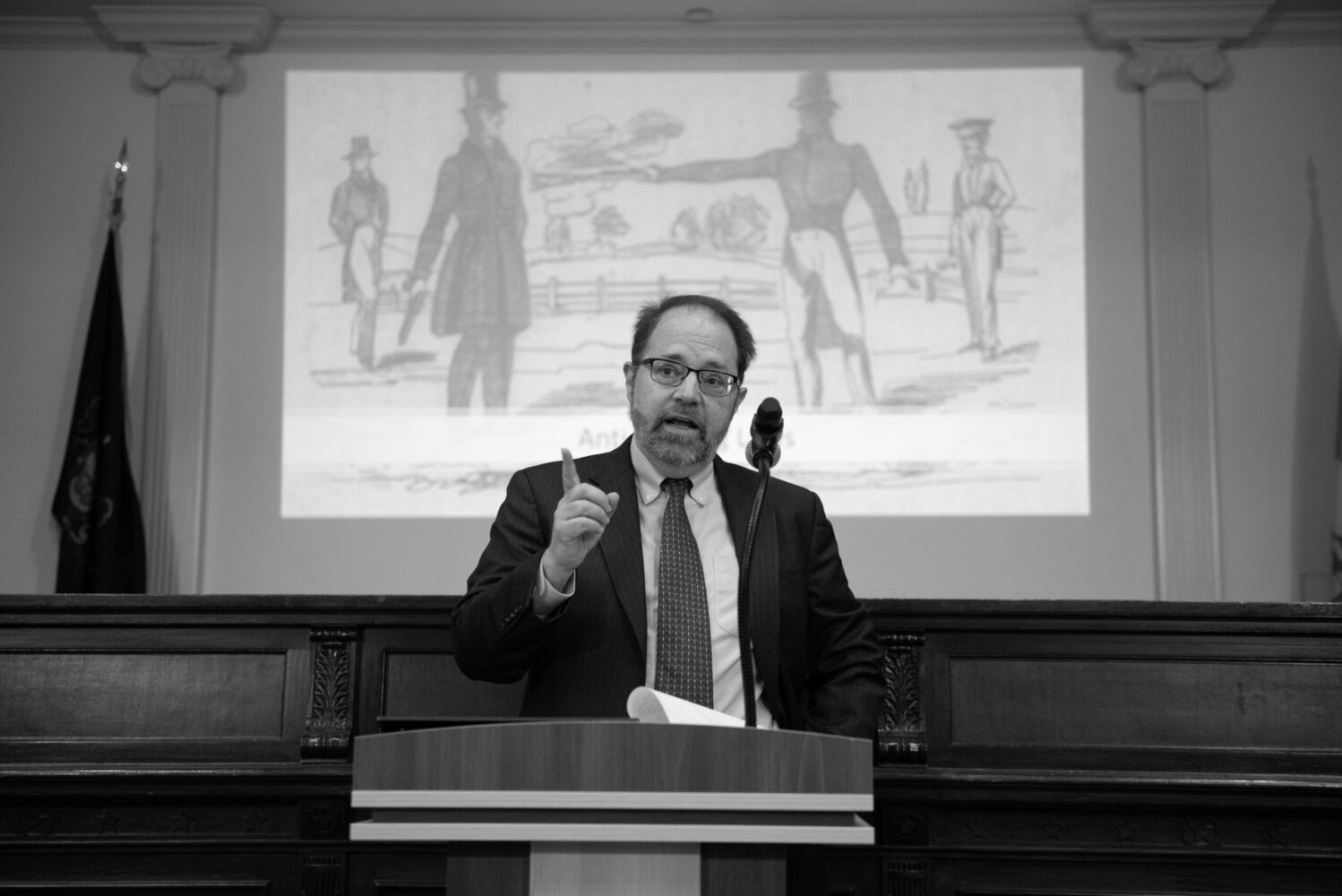April 21, 2025
The Friel-Scanlan Award is given to one faculty member of the Temple University Beasley School of Law each year in recognition of outstanding faculty scholarship. The recipient then delivers a lecture to the law school community. This year, the honor was awarded to Professor Harwell Wells, the Richard H. Walker ’75 Chair in Business Law, whose lecture was entitled “Ethical Lives and Business Forms.”
This edition of the Friel-Scanlan Lecture was focused on Peck v. Greyhound, the story of two civil rights leaders and their attempt to use corporate law as a vehicle to protest segregation in the 1940s South. James Peck, a white man, and Bayard Rustin, a Black man, were well-known radicals (Rustin later a famous civil rights leader) who banded together an interracial group of protestors known as the Fellowship of Reconciliation to embark on a mission to protest Southern state laws mandating segregation. The goal of the Journey of Reconciliation, as their protest was termed, was to highlight the absurdity of these laws in the wake of Morgan v. Virginia, a Supreme Court case that outlawed racial discrimination in interstate travel. Southern states, however, had retained and enforced laws requiring the segregation of intrastate travelers. The protestors boarded Greyhound buses and sat side by side, Black protestors next to white protestors, in silent protest of these laws. This resulted in arrests, threats, and violence against them.
The Journey of Reconciliation took place against the backdrop of the creation of the Securities and Exchange Commission (SEC)’s shareholder proposal rule in 1942. This gave shareholders of a corporation the right to make proposals at meetings, and these proposals were required to be sent to all shareholders in corporate proxy statements. It was a powerful tool for minority shareholders, enabling them to broadcast their concerns both to a company’s board of directors and other shareholders. The rule was later amended to allow a corporation’s board to exclude the proposal if it did not pertain to the corporation’s specific operations, and instead was of a general economic, political, or social nature.
Prior to the Journey of Reconciliation, Peck and Rustin each purchased $30 worth of Greyhound stock. This enabled them to submit a shareholder proposal in 1949 to end Greyhound’s policy of compliance with the state laws requiring segregation. Peck and Rustin believed that, because shareholder meetings were widely covered in newspapers, it was the perfect stage for a public protest. However, Greyhound denied their proposal, claiming it was excludable under the shareholder proposal rule as general social or political subject matter. The SEC later sent a no-action letter agreeing with Greyhound.
Peck filed suit against Greyhound, arguing that the proposal was proper for shareholder consideration because it targeted a specific corporate policy and potential litigation from Black passengers could harm shareholders. In 1952, the SEC responded with a new amendment to the shareholder proposal rule: a corporation’s board of directors could exclude shareholder proposals that were of general racial or religious subject matter, in addition to the prior exclusions for economic, political, or social proposals.
The new shareholder proposal rule stopped Peck’s case dead in its tracks and placed a stain on corporate securities law that remained in place until 1976. To Professor Wells, it also illustrates that a minor change to one regulation can have massive consequences. The mere addition of two words shut down a significant avenue of protest and allowed racism to remain entrenched in American corporate law for more than two decades.
A further takeaway that Professor Wells draws from Peck is a reminder to think about what belongs in corporate securities laws. Seventy-five years ago, the sole focus was on protecting the shareholder. While that may still hold true in some regards today, legal scholars have expanded their views of the corporation to include their role in society and the community. More attention has been given to the intersection of race and gender with corporate law. For Professor Wells, there is nothing natural about these historical exclusions.
For more information, Professor Wells’s article Shareholder Meetings and Freedom Rides: The Story of Peck v. Greyhound can be found here.
John Trismen (LAW ’26) is a Student Editor for The Temple 10-Q.
